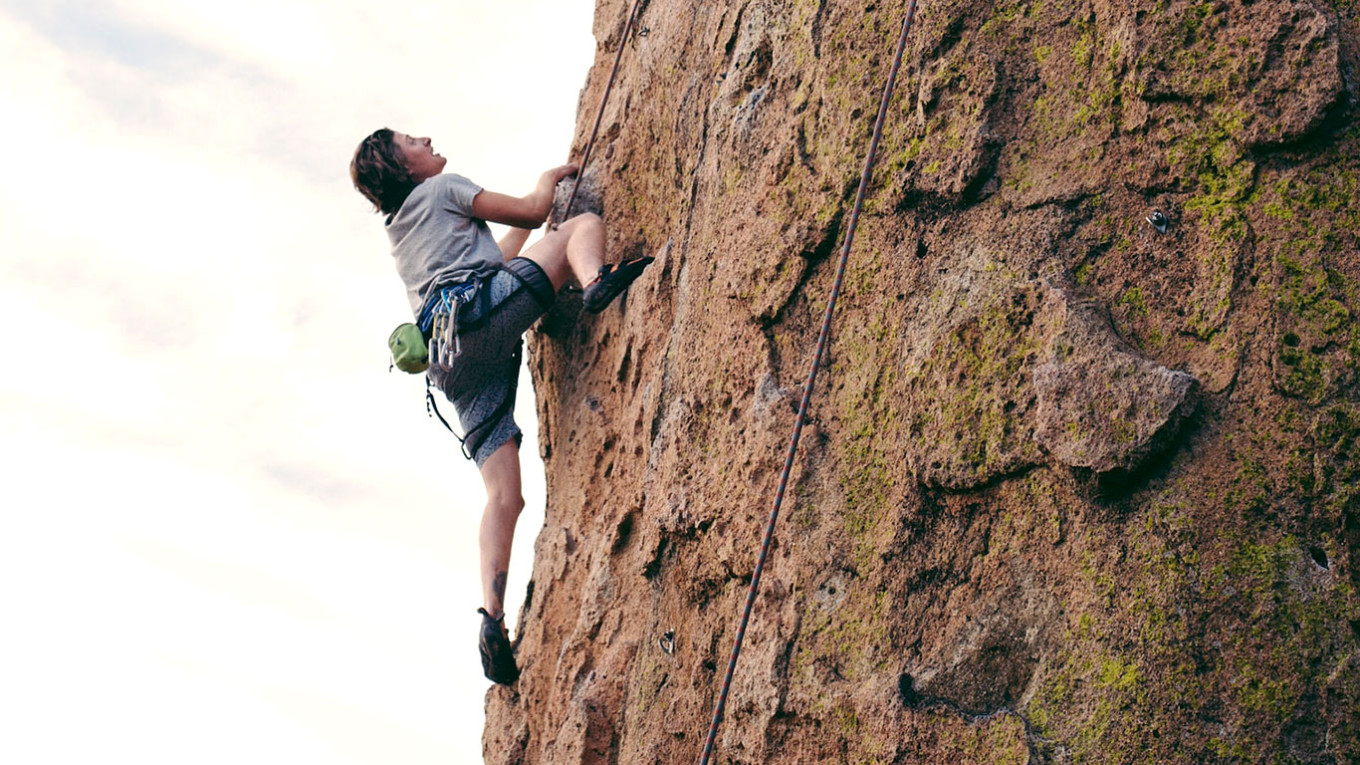Лезть: climb, crawl, push, pester, butt in, hit on, get involved, etc.
A couple of years ago I briefly mentioned the verb лезть in an article about another word, thinking at the time that I was doing a grave injustice to лезть. It’s a great little word. Its first literal meaning is to climb or to crawl — to move by grabbing onto something, pulling yourself along or by crawling under something. But it has a half dozen other meanings — some related to the first meanings, some figurative — and has generated another dozen expressions. It is a verb everyone should know and master, if only for the visceral pleasure of shrieking КУДА ТЫ ЛЕЗЕШЬ?! when some shameless person tries to cut ahead of you in a line you’ve been standing in for two hours.
Лезть is not always so hot-tempered. It’s neutral if you are describing what someone did when the house alarm wouldn’t shut off: Пришлось лезть наверх, чтобы обрезать провод сигнализации (I had to climb up to cut the wire and disable the alarm). Or what someone did when you dropped your purse under the table in a restaurant: Она лезла под стол (She crawled under the table). Or what someone else did when he forgot his house key: Он лез в окно (He crawled in through the window).
And it can be neutral when you are reaching inside something, like лезть в шкаф за книгой (pulling a book off the shelf). Or you might put your entire body in something — or try not to: Я бы побоялся лезть в воду (I’d be afraid to get into the water). Or you might be advised to: Гроза собирается. Лезь в палатку. Пересидим. (A storm is coming, get into the tent. We’ll sit it out.) Or for reasons unknown you might deeply resent having to check something: Могу посмотреть в словаре — но не хочу быть вынужденным лезть в словарь (I might look in a dictionary, but I don’t want to be compelled to look in a dictionary).
Whatever.
Inanimate objects do a lot of crawling around. When you want to say that something doesn’t fit into a space, you use лезть: Все вещи не лезли в один чемодан (All my things didn’t fit into one suitcase). If you want to describe something you or other humans don’t fit into, add the prefix в: Мне пришлось сильно похудеть, чтобы влезть в это платье (I had to lose a lot of weight to get into that dress). Вы удивитесь сколько народу может влезть в автобус (You’d be surprised at how many people can fit into a bus).
And when you have had too much to eat, or when you’re not feeling well, or when you can’t stand a particular food, a spoon “won’t get into your mouth”: Ложка в рот не лезет. Всё пересолено, всё переперчено (I couldn’t eat a bite. Everything had too much salt and pepper).
In colloquial Russian — that is, the language everyone uses in everyday life — лезть is the barging in, sticking your nose where it doesn’t belong, being pushy, or hitting on someone verb. It’s how you describe that pushy lady described above who tries to лезть без очереди (cut into line) at the ticket office. It’s what you shout at your Significant Other when they decide to break up two drunks fighting on the street. Куда же ты лезешь? С ума сошёл? (Stay out of it! Are you crazy?!) Лезть в драку (getting involved in a fight) is never a good idea. As they say: Двое дерутся — третий не лезь (When two are fighting, a third should not barge in). Or it’s your complaint about your neighbor, who лезет с долгими разговорами (starts in on long conversations). Or what you tell your friend: Даже не думай лезть к ней (Don’t you even think about hitting on her).
I haven’t heard this usage a great deal — perhaps because I don’t hang around with the right people — but лезть is also used to describe trying to wrangle a high position. Here you use лезть + в + whatever job title you want in the plural and nominative case. Он лезет в начальники (He’s angling for a managerial position).
And then, oddly to my mind, лезть describes things that do the opposite: hair falling out, pages of books coming apart, sweaters that leave threads and bits of yarn on chairs: Как только вы заметили, что лезут волосы, самым правильным решением будет посещение специалиста (As soon as you notice that your hair is falling out, the right thing to do is to see a specialist).
But note: in less dire cases, you should just see your barber: Волосы у меня длинные и лезут в глаза (I’ve got long hair that keeps getting in my eyes).
Everyone should know at least some of these very handy лезть expressions. Лезть в or на глаза means to try to be noticed: Он старался как можно внушительней отдать честь офицеру и, казалось, нарочно лез на глаза (He tried to make a real show out of saluting the officer and, it seemed, intentionally tried to get noticed). In other situations you might want the opposite: Залечь на дно, не лезть на глаза и держать ухо востро (Lay low, don't stick out and keep your ear to the ground).
Лезть на стену is nicely analogous to the English “climb the walls”: Я просто уже на стенку лезу (I'm already climbing the walls).
Лезть из кожи вон (literally to crawl out of your skin) is what you do when you are trying really, really hard. In English we perform other acrobatic acts: Вы заставили меня лезть из кожи вон ради вашей поддержки (You made me jump through hoops for your endorsement). The opposite is preferable: Здесь вам не придется лезть из кожи вон, чтобы добиться желаемого (Here you don’t have to bend over backwards to get what you want).
If something ни в какие ворота не лезет (literally “doesn’t fit through any gate”) it means it is unacceptable, inappropriate: Его реплика ни в какие ворота не лезет (His comment is totally out of line).
In general, you also wouldn’t like thoughts to pop into your head (лезть в голову). In Russian any thoughts or ideas that push themselves in are usually bad: Постарайтесь занять себя каким-то делом - это отличный способ избавиться от негативных мыслей, которые постоянно будут лезть в голову (Try to keep busy. That’s a great way of getting rid of the negative thoughts that constantly pop into your mind).
And there is one лезть expression that I always get wrong: лезть в бутылку (literally to crawl into a bottle). To me it sounds like it means “hit the bottle” but it doesn’t. It means to get very upset, lose your temper. Не у всех получается не лезть в бутылку (Not everyone is able to keep their temper).
But one has to keep working at it, however hard it is. To get something you want, in Russian you climb down in: Чтобы рыбку съесть, надо в воду лезть (literally "to eat the fish you need to get into the water") In English we climb up: "He that would eat the fruit must climb the tree."
A Message from The Moscow Times:
Dear readers,
We are facing unprecedented challenges. Russia's Prosecutor General's Office has designated The Moscow Times as an "undesirable" organization, criminalizing our work and putting our staff at risk of prosecution. This follows our earlier unjust labeling as a "foreign agent."
These actions are direct attempts to silence independent journalism in Russia. The authorities claim our work "discredits the decisions of the Russian leadership." We see things differently: we strive to provide accurate, unbiased reporting on Russia.
We, the journalists of The Moscow Times, refuse to be silenced. But to continue our work, we need your help.
Your support, no matter how small, makes a world of difference. If you can, please support us monthly starting from just $2. It's quick to set up, and every contribution makes a significant impact.
By supporting The Moscow Times, you're defending open, independent journalism in the face of repression. Thank you for standing with us.
Remind me later.







